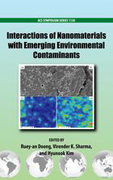
Interactions of Nanomaterials with Emerging Environmental Contaminants
Doong, Ruey-An
Sharma, Virender K.
Kim, Hyunook
A discussion of environmental contaminants and nanomaterials, stemming from an official symposium of the American Chemical Society. Emerging environmental contaminants are newly identified or previously unrecognized pollutants, which primarily include human and veterinary pharmaceuticals and personal-care products, surfactants, plasticizers, flame retardants, metals and metalloids, various industrial additives, pesticides, and pesticide metabolites. The use of novel nanomaterials with unique characteristics has been demonstrated to increase the removal efficiency of emerging pollutants, which provides a promising strategy to control the distribution of environmental contaminants. In addition, nanomaterials also can serve as ideal platforms for precise and accurate detection and sensing of emerging contaminants in the environment and biological fluids; this is because of their novel characteristics on optical and electrochemical properties. The interactive research of nanomaterials with emerging environmental contaminants will improve our understanding of the implication and application of nanomaterials in the environment. This book is derived from the symposium <"Interactions of Nanomaterials with Emerging Environmental Contaminants>" at the 244th ACS National Meeting in Philadelphia during the fall of 2012 sponsored by the American Chemical Society (ACS) Division of Environmental Chemistry. Many topics addressing issues of interaction of emerging environmental pollutants with nanomaterials (including physical, photochemical, and biological interactions) were presented in this symposium, and they constitute the main content of this book. This book contains 12 peer-reviewed chapters that cover various aspects of interaction of various nanomaterials with environmental contaminants. These chapters can be organized into two major sections: (I) interaction of nanomaterials with biomolecules for biosensing and detection of contaminants (Chapter 1-4) and (II) interaction of nanomaterials with contaminants to enhance the removal efficiency and rate of emerging pollutants (Chapter 5-12).
- ISBN: 978-0-8412-2916-7
- Editorial: OXFORD UNIVERSITY PRESS.
- Encuadernacion: Tela
- Páginas: 256
- Fecha Publicación: 07/08/2014
- Nº Volúmenes: 1
- Idioma:
